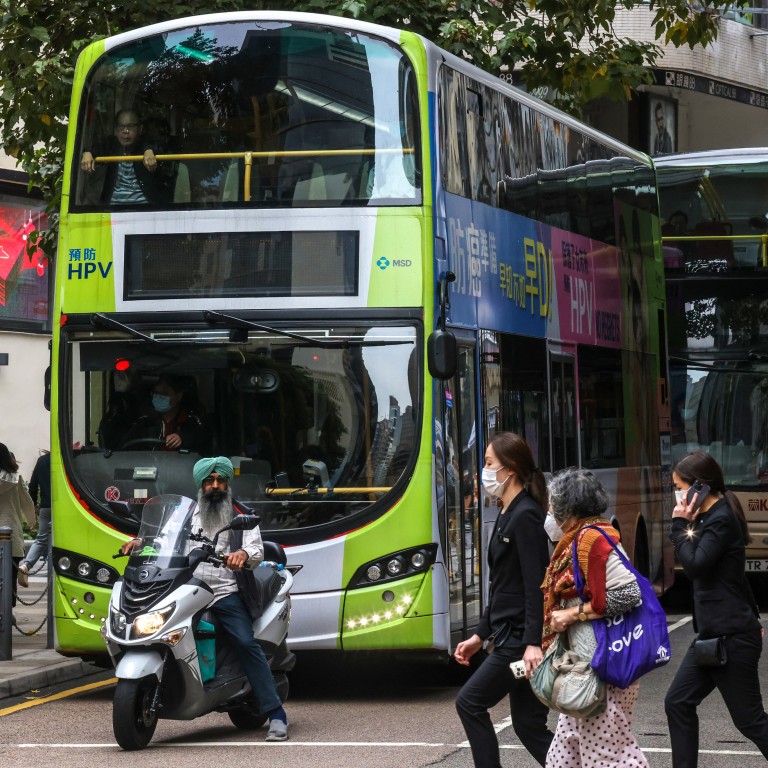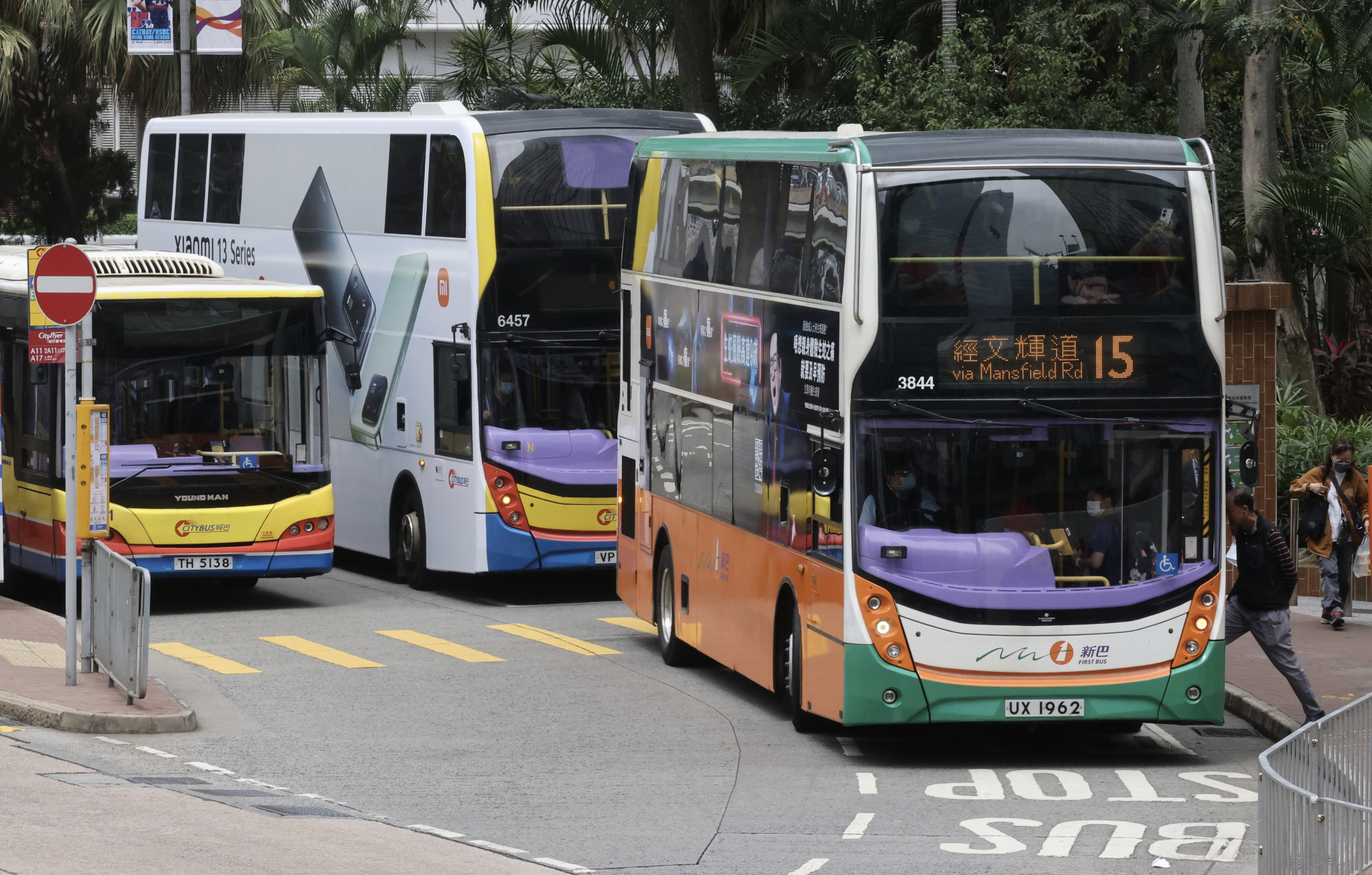
Hong Kong bus companies’ push for fare increases of up to 50 per cent amid city’s slow recovery from Covid-19 called ‘ridiculous’
- KMB, Long Win Bus, New Lantao Bus, Citybus and New World First Bus have applied to raise fares
- Proposed increases of between 8.5 per cent and 50 per cent said by lawmaker and public transport pressure group to be ‘unreasonable’
Hong Kong’s franchised bus companies have applied to raise fares by up to 50 per cent, sparking concerns about affordability for commuters being asked to pay more for public transport amid an economic downturn.
Lawmaker Michael Tien Puk-sun, a former chairman of the Kowloon-Canton Railway Corporation, said the proposed increases, especially those from sister companies Citybus and New World First Bus, were unreasonably high.
He highlighted the two firms’ flat fare increase of HK$2 represented an average increase of at least 24 per cent, about seven times the 3.5 per cent inflation rate over the last two years.
“For KMB, it also proposed a fare increase almost three times the 3.5 per cent inflation rate. If they had only asked for a fare rise that was about half of the inflation rate, 1.8 per cent, I would support it as this will also be acceptable to the public,” he said.
“But now it has become a big issue. The government should think over how it should handle it.”
He later added that the proposed high fare hikes stemmed from the long-standing problem that franchised bus firms did not raise fares every year, so they needed to play catch up with inflation.

Quentin Cheng Hin-kei, a spokesman for commuter pressure group the Public Transport Research Team, agreed the bus firms had made unreasonable fare rise requests, especially Citybus and New World First Bus.
“For the Citybus North Lantau and airport routes, I accept that the fares have not been adjusted for 25 years,” he said.
“But for the other routes, a flat fare rise of HK$2 will mean a rise of 50 per cent for some urban routes, which would really be ridiculous. Citybus and New World First Bus need to revise down their fare increases.”
The bus firms applied for price increases early last year, with the proposed fare rises ranging from 8.5 per cent to 50 per cent, a Legislative Council paper submitted by the Transport and Logistics Bureau on Tuesday said.
Transport providers earlier attributed the decision to higher operating costs and falling passenger levels amid the pandemic.
The companies applying for the fare increases are KMB, the city’s largest bus operator, sister company Long Win Bus, as well as New Lantao Bus, as well as sister firms Citybus and New World First Bus.
KMB, Long Win Bus and New Lantao Bus are seeking to raise fees by 9.5 per cent, 8.5 per cent and 9.8 per cent, respectively.
Citybus and New World First Bus, both owned by Bravo Transport, have asked for a flat fare increase of HK$2 across all urban routes and a 23 per cent rise for North Lantau services. The firms have also proposed a 50 per cent price hike for “airbus” services to and from the airport.
Hong Kong bus firms seek to raise fares by up to 20 per cent
The bureau said it would take into account factors such as each company’s operating costs, estimated returns and profits, fare affordability and service quality and quantity before making a decision.
The government also warned it would not rule out rejecting proposals or recommending a smaller increase if “a franchisee’s application is considered to be excessive”.
Legislators and the Transport Advisory Committee, which advises the city leader, will also discuss the proposal before they submit recommendations to the Executive Council, the chief executive’s top advisory body, for a decision.
The bureau said average daily ridership was 3.2 million between 2020 and 2022, down at least 16 per cent from 3.8 million to 4.0 million in the decade from 2010 to 2019.
It also highlighted the devastating impact of the pandemic and keen competition for passengers from other forms of transport.
Because of wage increases and higher fuel costs, as well as plummeting usage, most franchised bus operators recorded hefty losses in the past few years.
Citybus and New World First Bus were the hardest hit, posting a loss of almost HK$340 million and HK$87 million respectively from 2019 to 2021.
Long Win Bus and New Lantao Bus lost more than HK$40 million and HK$420 million in the 2020 and 2021 financial years.
KMB was the only franchised bus operator that managed to turn a profit in 2020 and 2021, totalling HK$317.5 million.
Hong Kong’s Star Ferry went overboard with fare proposal: transport authorities
Citybus and New World First Bus got approval in 2021 to increase fares for its urban routes in two phases – by 8.5 per cent in April 2021 and 3.2 per cent on January 2 last year.
But its fares on the North Lantau and airport routes have not been upped since 1998.
KMB also raised fares by 5.8 per cent and New Lantao Bus charged its passengers 9.8 per cent more from April 2021. Long Win Bus last increased its fares by 3.2 per cent in May 2011.
Citybus and New World First Bus on Tuesday blamed increased operational costs and falling passenger numbers for the fare hikes.
“We are coming out of this period with a change in travel patterns with a 10 per cent reduction in ridership,” the firms said.
“We have also seen dramatic increases in fuel and wage costs, as well as a loss of customers because of the opening of new rail lines.”
Both said earlier fare increases had failed to keep up with the rate of inflation, which had risen by almost 50 per cent between 2008 and 2023. Their accumulated fare increases amounted to 19 per cent over the period.
Citybus said the proposed fare increases on the North Lantau and airport routes amounted to less than an equivalent one per cent fare increase a year since the last fare hike in 1998.

